
Bogotá, officially Bogotá, Distrito Capital, abbreviated Bogotá, D.C., and formerly known as Santa Fe de Bogotá during the Spanish Colonial period and between 1991 and 2000, is the capital and largest city of Colombia, and one of the largest cities in the world. The city is administered as the Capital District, as well as the capital of, though not politically part of, the surrounding department of Cundinamarca. Bogotá is a territorial entity of the first order, with the same administrative status as the departments of Colombia. It is the main political, economic, administrative, industrial, cultural, airport, technological, scientific, healthcare and educational center of the country and northern South America.

Andrés de Jesús María y José Bello López was a Venezuelan humanist, diplomat, poet, legislator, philosopher, educator and philologist, whose political and literary works constitute an important part of Spanish American culture. Bello is featured on the old 2,000 Venezuelan bolívar and the 20,000 Chilean peso notes.

Departments of Colombia refer to the administrative divisions of Colombia. As of 2024, the unitary republic is made up of thirty-two departments. Each department has a governor and an assembly, elected by popular vote for a four-year period.

Cúcuta, officially San José de Cúcuta, is a Colombian municipality, capital of the department of Norte de Santander and nucleus of the Metropolitan Area of Cúcuta. The city is located in the homonymous valley, at the foot of the Eastern Ranges of the Colombian Andes, on the border with Venezuela. It comprises an area of approximately 1119 km2, with an urban area of 64 km2 and a rural area of 1055 km2. The city has a population of 777,106 inhabitants, which makes it the most populous municipality in the department and the sixth most populous municipality in the country. Similarly, its metropolitan area has an approximate population of 1,046,347.

Francisco José de Paula Santander y Omaña was a Neogranadine military and political leader who served as Vice-President of Gran Colombia between 1819 and 1826, and was later elected by Congress as the President of the Republic of New Granada between 1832 and 1837. Santander played a pivotal role in the Colombian War of Independence being one of the main leaders of the Patriot forces and helped lead the Patriot Army alongside Simón Bolívar to victory. He's often credited with creating the legal foundations for democracy in Colombia, as well as creating the country's first system of public education. For these reasons he is considered a National Hero in Colombia and has thus commonly been known as "The Man of the Laws" as well as the "Organizer of Victory".
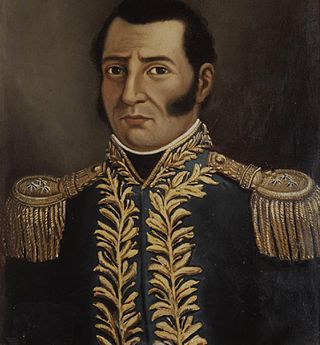
Admiral José Prudencio Padilla López was a Neogranadine military leader who fought in the Spanish American wars of independence and a hero in the battles of independence for Gran Colombia .
He was the foremost naval hero of the campaign for independence led by Simón Bolívar, and the creator of the first Navy and Admiral of Great Colombia. He is best known for his victory in the Battle of Lake Maracaibo on 24 July 1823, in which a royalist Spanish fleet was defeated.
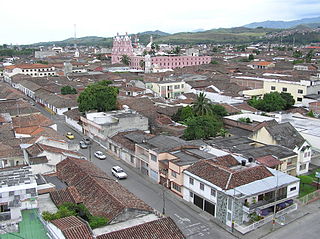
Buga, formally Guadalajara de Buga, is a city and municipality in the Valle del Cauca Department of Colombia. It is famous for its Basilica del Señor de los Milagros, which houses an image of Christ called el Señor de los Milagros.
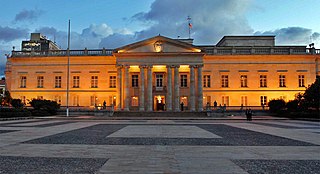
The Casa de Nariño, literally the House of Nariño, is the official residence and principal workplace of the President of Colombia. It houses the main office of the executive branch and is located in the capital city of Bogotá, Colombia. It was dedicated in 1908 after being constructed on the site of the house where Antonio Nariño was born. The design was made by architects Gastón Lelarge, a French-born former pupil of Charles Garnier, and Julián Lombana.

Chocontá is a municipality and town of Colombia in the Almeidas Province, part of the department of Cundinamarca. It is located on the Pan-American Highway. In 1938 Chocontá had a population of 2,041.
The constitutional history of Colombia is the process of formation and evolution of the different constitutions that Colombia has had since its formation.

Juan José Nieto Gil was a Colombian politician, Army general and writer. A Liberal party caudillo of Cartagena, he served interimly as Governor of the Province of Cartagena, and was later elected President of the Sovereign State of Bolívar from 1859 to 1864. In 1861, during the Colombian Civil War, he fought on the side of the Liberal rebels against the Administration of President Mariano Ospina Rodríguez, and acting in rebellion proclaimed himself President of the Granadine Confederation in his right as the Presidential Designate, relinquishing power four months later to the Liberal leader, General Tomás Cipriano de Mosquera y Arboleda, who led a successful coup d'état against the Conservative Government in Bogotá.
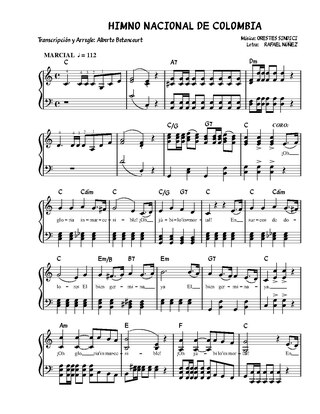
The "National Anthem of the Republic of Colombia" is the official name of the national anthem of Colombia. It was originally written as a poem in 1850 by future President Rafael Núñez as an ode to celebrate the independence of Cartagena. The music was composed by Italian-born opera musician Oreste Síndici, at the request of Bogotan actor José Domingo Torres, during the presidency of Núñez, and with lyrics refined by Núñez himself, it was presented to the public for the first time on 11 November 1887. The song became very popular and was quickly adopted, albeit spontaneously, as the national anthem of Colombia.
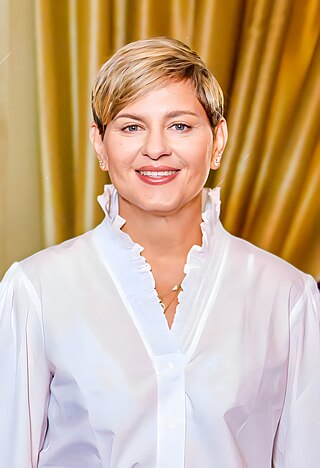
First Lady of Colombia is the title held by the hostess of the Casa de Nariño, generally the wife of the president of Colombia, coinciding with the president's mandate. Although the role of the first lady has never been codified or officially defined, according to the Constitutional Court of Colombia, the first lady holds the title of private citizen before the public administration, but this gives the first lady an additional special role, since that, Being the wife of the president, the first lady symbolically embodies, together with the president, under the idea of national unity in accordance with article 188 of the Constitution of Colombia. Since 1978, the first lady has been honorary president of the Colombian Institute of Family Welfare, an institution founded by the 22nd president Carlos Lleras Restrepo.
German Colombians are Colombian citizens of German ancestry. They may be descendants of Germans who immigrated to Colombia from Germany or elsewhere in Europe. Most German Colombians live in the departments of Andean Region and Caribbean Region. Germans have been immigrating to Colombia since at least 16th century. During World War II, thousands of Germans fled to Colombia.

Colegio Mayor de San Bartolomé is a private Catholic pre-school, primary and secondary school, colonial of Plateresque style building, located in the Santa Fe district of Bogotá, Cundinamarca, Colombia. The co-educational school was founded on 27 September 1604 by the Archbishop of Bogota Bartolomé Lobo Guerrero and the Jesuits José Dadey, Martín de Funes, Juan Bautista Coluccini, Martín de Torres, Bernabé de Rojas, and Diego Sánchez. The school is managed by the Society of Jesus.

Bolívar, una lucha admirable, or simply Bolívar, is a Colombian Spanish-language historical drama television series created by Juana Uribe, based on the life of Venezuelan liberator Simón Bolívar. The series stars Luis Gerónimo Abreu as Bolívar as an adult, José Ramón Barreto as Bolívar as a young man, Irene Esser as Bolívar's wife María Teresa del Toro, and Shany Nadan as his lover Manuela Sáenz. Maximiliano Gómez stars as Bolívar as a child. It was released on Netflix worldwide, except for Colombia, on 21 June 2019, followed by its debut in Colombia on Caracol Televisión on 18 September 2019.
Miss Universe Colombia is a national beauty pageant that selects the country's representative to the Miss Universe pageant.

Estanislao Vergara y Sanz de Santamaría was a Colombian lawyer, politician, and statesman.




















